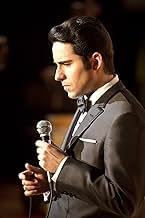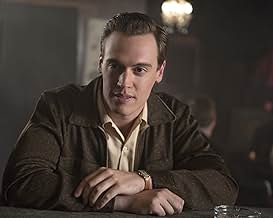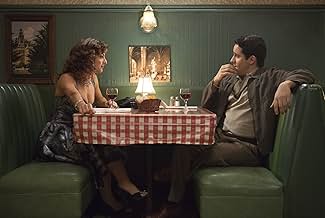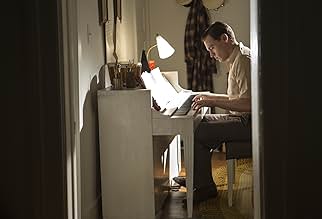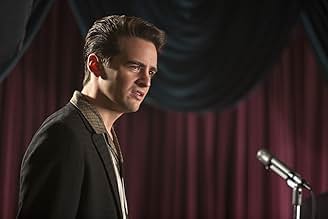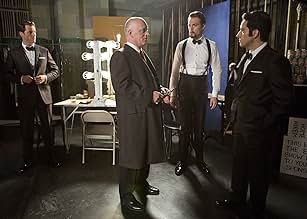IMDb-BEWERTUNG
6,8/10
37.901
IHRE BEWERTUNG
Der Film erzählt die Geschichte von vier jungen Männern aus einem Armeleuteviertel in New Jersey, die als Sixties-Kult-Popgruppe "The Four Seasons" berühmt werden.Der Film erzählt die Geschichte von vier jungen Männern aus einem Armeleuteviertel in New Jersey, die als Sixties-Kult-Popgruppe "The Four Seasons" berühmt werden.Der Film erzählt die Geschichte von vier jungen Männern aus einem Armeleuteviertel in New Jersey, die als Sixties-Kult-Popgruppe "The Four Seasons" berühmt werden.
- Auszeichnungen
- 4 Gewinne & 2 Nominierungen insgesamt
Steve Schirripa
- Vito
- (as Steven R. Schirripa)
Scott Michael Vance
- Prison Guard
- (as Scott Michael Morgan)
Empfohlene Bewertungen
Going into the movie I knew and liked the Four Season's music, but was unsure if I would like the movie (it would not have been my first or second pick to go see). However, I was able to see an early viewing of the film and took advantage of it. I must say I LOVED it. It had all of the songs I loved. The film has the right amount of humor when needed. I have not seen the Broadway show version. If you like their music it is worth going just for that as it is a mix of recordings from the Four Seasons and also recordings from the cast. While it is rated R for language, I did not find it excessive. Erich Bergen's performance stood out for me.
I have never seen a Clint Eastwood film that he has been either a producer or director. I was wary about seeing the film, but must admit that I thoroughly enjoyed it. I would Recommend this film
I have never seen a Clint Eastwood film that he has been either a producer or director. I was wary about seeing the film, but must admit that I thoroughly enjoyed it. I would Recommend this film
There's a reason why the 1960s is widely known as the "Golden Era" of music, specifically, the birth of what is now called Rock n Roll. Comprising of four British teenagers from Liverpool, The Beatles produced their first album (Please Please Me) in 1963 and went on to be regarded as the greatest rock and roll band of all time. But just a year earlier, in 1962, four boys from New Jersey made heads turn and girls swoon with a unique 'sound' to their music. Jersey Boys is the phenomenal true story of a 'sound' that took four boys from New Jersey's mob controlled suburbs and made them into the icons they are today – legends whose music is still celebrated more than five decades on!
Produced and directed by another living legend – Clint Eastwood – Jersey Boys is a Tony Award winning Broadway and West End musical adaptation of the same name. Scripted by Woody Allen's Oscar winning collaborate Marshall Brickman (Anne Hall and Manhattan), the story benefits from a deeply dramatized account of the stage production, thus making it a biopic rather than just a musical. This is why the audience has to wait a good hour before Frankie Valli (John Lloyd Young) makes our feet tap to the film's first real track: Sherry. But before we get to hear Young's remarkable rendition of Valli's incredible falsetto pitch, Brickman's story takes us through New Jersey's underworld circa. Valli is a good Italian-American kid but his friend Tommy DeVito (Vincent Piazza) is just the opposite. They are both connected to local mobster Gyp DeCarlo (Christopher Walken). Taking Valli under his wing, Tommy puts together a small time band but only manages mediocre returns while also moonlighting as juvenile delinquents. This changes with the arrival of Bob Gaudio (Erich Bergen), a golden goose of a singer- song writer whose epiphany changes the band's name from The Four Lovers to The Four Seasons. Then, with the addition of bass guitarist and singer Nick Massi (Michael Lomenda), Sherry, their first song as a band, becomes a hit and the group is instantly catapulted into nationwide fame.
By the time we get to the band's all-time number one hit single, Can't Take My Eyes Off You, there's trouble brewing. Domestic heartbreak and tragedy, ego trips and quarrels, financial crises and mob intervention turns cracks into fissures. Reminding us that this is in fact a stage show adaptation, Eastwood creates individual perceptions by allowing each member of the band to narrate his story directly to the camera. While this might seem like a theatre-cinema blending technique (ala Moulin Rouge!), it adds wholesome dimensions as a biography made for the discerning cinema audience. Adding on to that dimension is the juxtaposition of organized crime with the evolution of Doo-wop into rock and pop. In fact, there is a brief reference to Frank Sinatra, who as legendary as himself, was known to have ties with Chicago's notorious mobster Al Capone. To this effect, the story also includes real life actor Joe Pesci (Joey Russo) as a talent scout who recommends Bob to the band. Synonymous with mobster roles in previous films, Walken himself might seem like a cliché, but instead is entrusted with the film's humour and he delivers. Characterization from the rest leaves more to be desired. Young as front man Valli and Piazza as Tommy are more theatrical than expected in a film. It's a different matter when we get to see them perform as musicians – simply astonishing!
That there is no reference to era specific bands like The Beach Boys or the Bee Gees can be another letdown. Instead, Brickman's script remains parallel to the stage production with emphasis on an underdog rags-to-riches plot arc. Even so, as Eastwood's first musical adaptation, Jersey Boys has more hits than misses (excuse the pun). Like the Academy Award winning Walk The Line, a lot of focus has gone into the back story by dramatizing the true cost of fame and fortune. Above all, it is a brilliant narration on how pain and loss can conceive everlasting music. And judging from the need to make this film, it's no surprise that the music of Frankie Valli and The Four Seasons will always remain evergreen.
Produced and directed by another living legend – Clint Eastwood – Jersey Boys is a Tony Award winning Broadway and West End musical adaptation of the same name. Scripted by Woody Allen's Oscar winning collaborate Marshall Brickman (Anne Hall and Manhattan), the story benefits from a deeply dramatized account of the stage production, thus making it a biopic rather than just a musical. This is why the audience has to wait a good hour before Frankie Valli (John Lloyd Young) makes our feet tap to the film's first real track: Sherry. But before we get to hear Young's remarkable rendition of Valli's incredible falsetto pitch, Brickman's story takes us through New Jersey's underworld circa. Valli is a good Italian-American kid but his friend Tommy DeVito (Vincent Piazza) is just the opposite. They are both connected to local mobster Gyp DeCarlo (Christopher Walken). Taking Valli under his wing, Tommy puts together a small time band but only manages mediocre returns while also moonlighting as juvenile delinquents. This changes with the arrival of Bob Gaudio (Erich Bergen), a golden goose of a singer- song writer whose epiphany changes the band's name from The Four Lovers to The Four Seasons. Then, with the addition of bass guitarist and singer Nick Massi (Michael Lomenda), Sherry, their first song as a band, becomes a hit and the group is instantly catapulted into nationwide fame.
By the time we get to the band's all-time number one hit single, Can't Take My Eyes Off You, there's trouble brewing. Domestic heartbreak and tragedy, ego trips and quarrels, financial crises and mob intervention turns cracks into fissures. Reminding us that this is in fact a stage show adaptation, Eastwood creates individual perceptions by allowing each member of the band to narrate his story directly to the camera. While this might seem like a theatre-cinema blending technique (ala Moulin Rouge!), it adds wholesome dimensions as a biography made for the discerning cinema audience. Adding on to that dimension is the juxtaposition of organized crime with the evolution of Doo-wop into rock and pop. In fact, there is a brief reference to Frank Sinatra, who as legendary as himself, was known to have ties with Chicago's notorious mobster Al Capone. To this effect, the story also includes real life actor Joe Pesci (Joey Russo) as a talent scout who recommends Bob to the band. Synonymous with mobster roles in previous films, Walken himself might seem like a cliché, but instead is entrusted with the film's humour and he delivers. Characterization from the rest leaves more to be desired. Young as front man Valli and Piazza as Tommy are more theatrical than expected in a film. It's a different matter when we get to see them perform as musicians – simply astonishing!
That there is no reference to era specific bands like The Beach Boys or the Bee Gees can be another letdown. Instead, Brickman's script remains parallel to the stage production with emphasis on an underdog rags-to-riches plot arc. Even so, as Eastwood's first musical adaptation, Jersey Boys has more hits than misses (excuse the pun). Like the Academy Award winning Walk The Line, a lot of focus has gone into the back story by dramatizing the true cost of fame and fortune. Above all, it is a brilliant narration on how pain and loss can conceive everlasting music. And judging from the need to make this film, it's no surprise that the music of Frankie Valli and The Four Seasons will always remain evergreen.
"Four guys under a street lamp, when it was all still ahead of us, the first time we made that sound — our sound." Frankie Valli (John Lloyd Young)
It's next to impossible to compare director Clint Eastwood's entertaining Jersey Boys with the popular juke-box stage hit without feeling that the live production is superior. It could be using some of the stage cast, including the excellent John Lloyd Young as Frankie, highlights the electricity of physical presence over the celluloid mimicry. Or maybe because it seemed like a fuller musical on stage, with complete songs and less family squabbling. Or maybe because Christopher Walken's mobster, Gyp DeCarlo, is underplayed.
But more to the point, this film is a story of rags to riches with the speed bumps large and disorientations many despite the transcendence of the music (Sherry Baby and Walk Like a Man are only two of the memorable hits by this unusually gifted group). Eastwood spends considerable opening capital on the home life of the Jersey boys with the overdone Sopranos accent and run-ins with local cops to the exclusion of the actual development of their famous songs.
With the emergence of the Four Seasons, the musical becomes vibrant. Eastwood deftly weaves the songs into the narrative without bringing attention to just the songs. Somehow after the death of Valli's beloved but troubled daughter, My Eyes Adored You fits the distancing that fame brought to the relationship and the sadness of the loss. As Frankie moves into performances without his original group in order to pay off mob debt for his partner, Tommy DeVito (Vincent Piazza), the songs still evidence the greatness of the falsetto and the humanity of the singer.
Eastwood builds the sentiment into the narrative arc, beginning roughly in the hood and ending sweetly at the Hall of Fame, where the reunion reminds us of their unique charm even though they are old but not out of tune. Jersey Boys may not be the fullest musical imaginable with its middlin' family life sequences, but when it breaks into song with tunes accurately fitting the times, the film becomes a testimony to Clint Eastwood's ability in any genre and the glorious sound of real humans trying to balance audience, mob, and songs.
Maybe it's in the New Jersey water—someone ought to bottle it; otherwise never again will we enjoy the high-pitched romance of local boys making great music. A musical about that rarity has its challenge built into a narrative that must compete with the almost supernatural expression of music:
"After silence, that which comes nearest to expressing the inexpressible is music." Aldous Huxley
It's next to impossible to compare director Clint Eastwood's entertaining Jersey Boys with the popular juke-box stage hit without feeling that the live production is superior. It could be using some of the stage cast, including the excellent John Lloyd Young as Frankie, highlights the electricity of physical presence over the celluloid mimicry. Or maybe because it seemed like a fuller musical on stage, with complete songs and less family squabbling. Or maybe because Christopher Walken's mobster, Gyp DeCarlo, is underplayed.
But more to the point, this film is a story of rags to riches with the speed bumps large and disorientations many despite the transcendence of the music (Sherry Baby and Walk Like a Man are only two of the memorable hits by this unusually gifted group). Eastwood spends considerable opening capital on the home life of the Jersey boys with the overdone Sopranos accent and run-ins with local cops to the exclusion of the actual development of their famous songs.
With the emergence of the Four Seasons, the musical becomes vibrant. Eastwood deftly weaves the songs into the narrative without bringing attention to just the songs. Somehow after the death of Valli's beloved but troubled daughter, My Eyes Adored You fits the distancing that fame brought to the relationship and the sadness of the loss. As Frankie moves into performances without his original group in order to pay off mob debt for his partner, Tommy DeVito (Vincent Piazza), the songs still evidence the greatness of the falsetto and the humanity of the singer.
Eastwood builds the sentiment into the narrative arc, beginning roughly in the hood and ending sweetly at the Hall of Fame, where the reunion reminds us of their unique charm even though they are old but not out of tune. Jersey Boys may not be the fullest musical imaginable with its middlin' family life sequences, but when it breaks into song with tunes accurately fitting the times, the film becomes a testimony to Clint Eastwood's ability in any genre and the glorious sound of real humans trying to balance audience, mob, and songs.
Maybe it's in the New Jersey water—someone ought to bottle it; otherwise never again will we enjoy the high-pitched romance of local boys making great music. A musical about that rarity has its challenge built into a narrative that must compete with the almost supernatural expression of music:
"After silence, that which comes nearest to expressing the inexpressible is music." Aldous Huxley
My wife and I were extremely and pleasantly surprised. I've never been into musicals...ever...my favorite up to this point was "The Sound of Music," which inspired me to get into the film industry in the first place, yet, we found ourselves seat dancing and bopping in our seats. We really enjoyed the interpersonal approach of having the characters each expressing their takes and their understanding of each situation, which brought a lot of comedic character moments to the storyline and subplots.
But the the thing that impressed us the most, was the decision to make the film NOT feel like a musical. No-one busted out in song at the wrong time...and the singing moments felt completely unforced. It was like watching a living biographical film. Great Directing job by Clint Eastwood.
Lastly, we didn't realize how many great hits Frankie Valli & the Four Seasons had. We thoroughly loved this movie....and can't wait to buy the soundtrack.
The theater was pack...and it was the biggest theater in the Tampa Bay area.
But the the thing that impressed us the most, was the decision to make the film NOT feel like a musical. No-one busted out in song at the wrong time...and the singing moments felt completely unforced. It was like watching a living biographical film. Great Directing job by Clint Eastwood.
Lastly, we didn't realize how many great hits Frankie Valli & the Four Seasons had. We thoroughly loved this movie....and can't wait to buy the soundtrack.
The theater was pack...and it was the biggest theater in the Tampa Bay area.
It was not my call to see this movie but so glad I went along for the ride! It has at least a little something for everyone and a LOT for Frankie Valli fans. Granted, the narration is a little distracting at first, but you quickly get so into the story and the characters; the good times and the bad, that you adapt to it quickly. I thought I was tired of their music but I couldn't get enough of it. After several of the songs, the entire audience clapped as though we were at the performance portrayed in the movie. Eastwood knows what moves us, what makes us laugh and how to get us on our feet. He delivers it all big time. Seriously, what more do you want from a movie?
Wusstest du schon
- WissenswertesThe actors sang live on set.
- PatzerSince the late 1800s, the Ohio State Fair is held in Columbus, not Cleveland.
- Zitate
Mary: Do you have a nickel?
Frankie Valli: Yeah.
Mary: Call your mother, you're going to be home late.
- Crazy CreditsDuring the credits, the actors who were seen in the film are seen dancing to Oh What a Night (December 1963).
- SoundtracksDecember 1963 (Oh What a Night)
Written by Bob Gaudio (as Robert Gaudio) and Judy Parker
Top-Auswahl
Melde dich zum Bewerten an und greife auf die Watchlist für personalisierte Empfehlungen zu.
Details
- Erscheinungsdatum
- Herkunftsland
- Offizieller Standort
- Sprachen
- Auch bekannt als
- Jersey Boys: persiguiendo la música
- Drehorte
- Produktionsfirmen
- Weitere beteiligte Unternehmen bei IMDbPro anzeigen
Box Office
- Budget
- 40.000.000 $ (geschätzt)
- Bruttoertrag in den USA und Kanada
- 47.047.013 $
- Eröffnungswochenende in den USA und in Kanada
- 13.319.371 $
- 22. Juni 2014
- Weltweiter Bruttoertrag
- 67.647.013 $
- Laufzeit2 Stunden 14 Minuten
- Farbe
- Sound-Mix
- Seitenverhältnis
- 2.39 : 1
Zu dieser Seite beitragen
Bearbeitung vorschlagen oder fehlenden Inhalt hinzufügen








